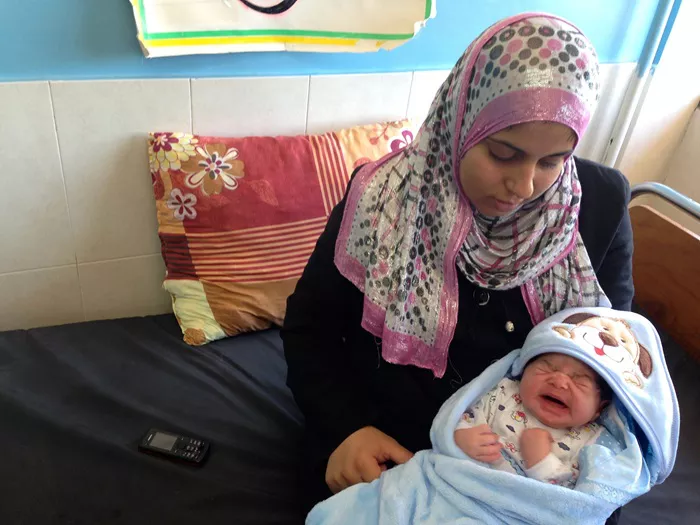Early one May morning in Rafah, Palestine, contractions began for Bahr in a flimsy tent among the rubble. With no car, she found a donkey cart to take her to Al Helal Al Emirati Maternity Hospital as her contractions intensified.
Upon arrival, Bahr was tenth in line and waited three hours to see a doctor. It took another three hours before she could give birth to her daughter, Ghina, by cesarean section. However, Bahr developed blood clots and, with no available beds, she returned to her tent, making daily trips for treatment.
Two days after giving birth, Israeli forces stormed Rafah, forcing Bahr to flee her makeshift home, marking the fourth displacement for the 33-year-old originally from Deir al-Balah. “Since the war began, it has been a constant fight for survival, even for the most basic human right: bringing a child safely into the world,” Bahr said from Khan Younis.
Bahr is among thousands of women navigating the dangers of bombs and bullets to give birth in Gaza, where over 38,000 people have died since the Israeli-Hamas conflict began nine months ago. Following the Hamas attack on Israel on October 7, which killed around 1,200 people and took 250 hostages, Israeli forces launched an offensive. Over half of Gaza’s 2.3 million population has since crowded into Rafah.
In May, the World Health Organization reported that only about one-third of Gaza’s 36 hospitals and primary health care centers were partially operational. Israel claims hospitals are used by Hamas for military purposes, a claim denied by hospital staff and Hamas.
For new mothers like Bahr, giving birth is only the beginning of a traumatic journey. “The makeshift tent barely shields us from hot weather or bad weather, let alone the constant fear that grips our hearts. It’s no place to raise children, no place to recover from childbirth,” Bahr said. “My body is barely healed from childbirth, and now I have to fight to keep my daughter alive.”
UNICEF reports that mothers in Gaza face “unimaginable challenges” accessing medical care, nutrition, and protection. “The trauma of war directly impacts newborns, resulting in higher rates of undernutrition, developmental issues, and other health complications,” said Tess Ingram of UNICEF.
In May, Rafah’s main maternity hospital ceased admitting patients due to staff and patient shortages caused by the conflict. “We had prepared places for pregnant women on the floor because there were not enough beds,” said obstetrician Naheel Jarrour. Fighting had prevented her from reaching the hospital for weeks.
Many women are forced to give birth outside the formal medical system, said Aurelie Godard of Doctors Without Borders. “It is still a challenge for many women, especially in Rafah, to have access to transportation and hospitals,” she said. Humanitarian organizations struggle to provide services for around 2,200 monthly births in Gaza.
“My friend was trapped in the north and had to deliver her baby at home,” Jarrour said. “Alone in the bathroom, she cut the umbilical cord herself with scissors.” Miscarriages have risen due to food shortages and constant danger, according to ActionAid.
SEE ALSO: 10 Signs of Early Pregnancy
Critically ill patients also face risks from evacuation orders requiring the relocation of medical equipment. Hospitals like Abu Yousef al-Najjar and Kuwaiti hospital in Rafah have closed due to these orders.
The struggle for new mothers continues post-birth, with severe shortages of food, power, and essential supplies. Over 495,000 people in Gaza face catastrophic food insecurity, according to the Integrated Food Security Phase Classification. Israel claims it imposes no limits on humanitarian supplies and blames the United Nations for slow deliveries.
Medicines are scarce, forcing mothers to improvise. “The fear is constant. Will this homemade remedy work? Will I make things worse? This isn’t the kind of fear a mother should have to live with,” said Asmaa Salah Abu Jabal, who turned to the internet for remedies for her 4-month-old daughter’s cold.
Soad Al Masri, a 19-year-old new mother, described the challenges of caring for her newborn daughter Layan in the sweltering heat. “My daughter feels suffocated in her winter clothes that we borrowed from neighbors,” she said. To find some relief, Masri walks her daughter to the seashore, hoping for a cool breeze.
“Every time, the sight of my daughter struggling to breathe takes my soul,” she said.


